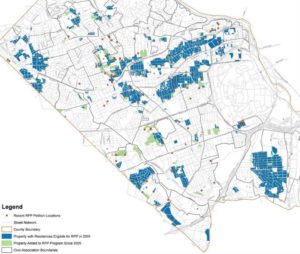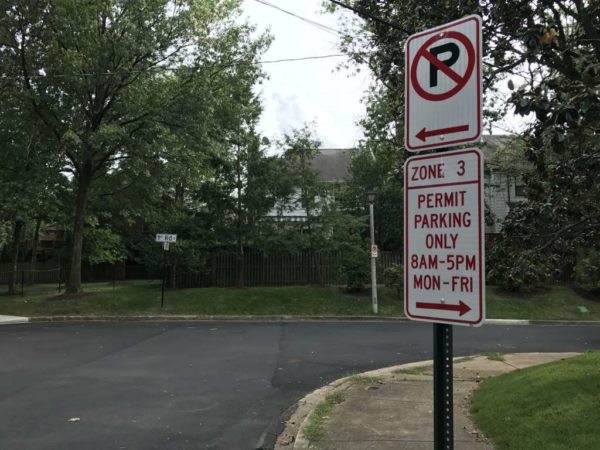Should Arlington open up more of its on-street parking to shoppers, commuters and other visitors, or continue to use a permit system to protect neighborhood parking spots?
That’s the sort of question county officials are asking as they collect feedback on how Arlington’s residential permit parking system is working. County staff are about halfway through a two-year review of Arlington’s residential parking practices, and they’ve opened up an online survey on the subject through July 16.
The zoned parking program is intended to ensure that residents can park near their houses in neighborhoods near business districts, employment centers and Metro stations. Residents were previously able to petition the county to have their street zoned, pending an analysis by county staff.
 The County Board is planning to hold a work session on residential parking in the coming months and establish a working group to study the matter, after voting last August to put a moratorium on any additions or changes to the county’s 24 zones where parking permits are required.
The County Board is planning to hold a work session on residential parking in the coming months and establish a working group to study the matter, after voting last August to put a moratorium on any additions or changes to the county’s 24 zones where parking permits are required.
The moratorium sparked complaints from some residents. There were 16 active petitions at the time from people looking to add new permit parking zones or change existing ones.
Among those worried about changes to the program is Penrose Neighborhood Association co-president Pete Durgan, who thinks the survey is tilted toward the goal of scaling back parking restrictions.
“Can you imagine what would happen to the single family areas near Ballston, Clarendon and Columbia Pike?” she asked, in an email to ARLnow.com.
County staff last reviewed Arlington’s parking program back in 2003, and the Board has since wrestled with the question of how to balance the concerns of residents looking to keep cars off their crowded streets with the frustrations of people hoping to find a place to park near the county’s burgeoning business districts.
The Board has also increasingly encouraged developers to move away from building off-street parking options in Metro corridors, in favor of adding new bike or car-sharing options, a policy change some worry will push residents to park on the street instead.
The survey asks respondents to rank the importance of the availability of on-street parking versus other factors, like the availability of public transit and open public space. The county also wants to hear what people think about how easy it should be for commuters or other visitors to park in their neighborhoods, and to evaluate whether “parking on public streets is a shared resource that should be open to all.”
The county first started its residential permit program in 1973 to keep commuters to Crystal City and D.C. out of residential areas. A series of court challenges to the program ultimately advanced to the U.S. Supreme Court, and the justices unanimously upheld the program’s legality in a 1977 decision.
County staff are hoping to wrap up this latest review of the program by the summer of 2019, when they could once again start considering petitions for changes to permit zones.
File photo


